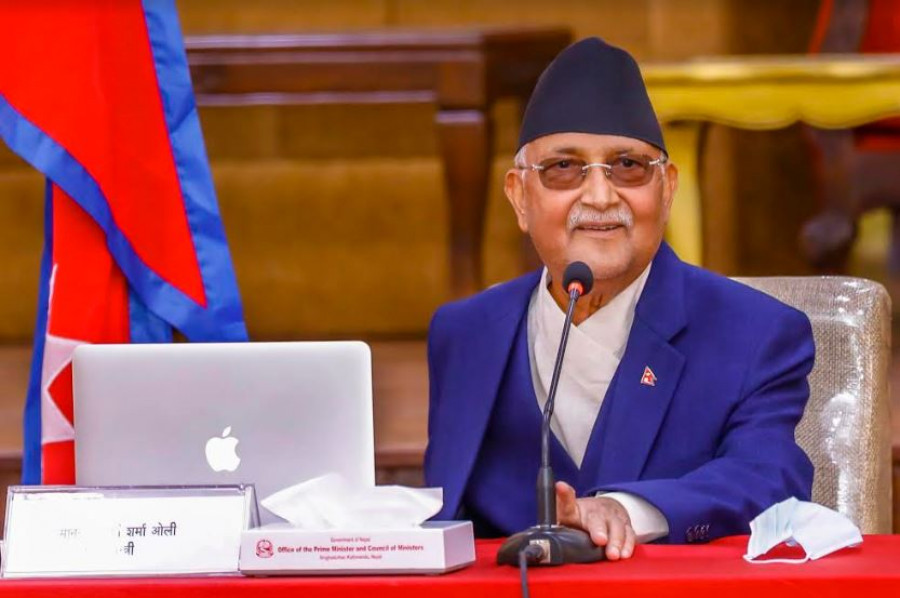National
Political faces suited to lead transitional justice bodies: Oli
PM roots for candidates who can deal with both domestic actors and international community to lead commissions.
Binod Ghimire
Prime Minister KP Sharma Oli has claimed that only political persons with knowledge in transitional justice can successfully lead the Truth and Reconciliation Commission and the Commission of Investigation on Enforced Disappeared Persons.
Taking the failure of the previous commissions twice as a reference, Oli said the leadership of the transitional justice mechanisms should have the capacity to deal with the domestic actors along with the international community.
Answering the concerns of officials from the National Human Rights Commission (NHRC) about the fate of the transitional justice process, Oli said he doesn’t solely take decisions on this matter.
“I have been adhering to whatever the Nepali Congress and the CPN (Maoist Centre) decide on the transitional justice process,” a member of the commission present in the meeting quoted Oli as saying. “I gave them a free hand even in proposing the names of chairs for the two commissions.”
The government on October 18 had formed the former chief justice Om Prakash Mishra-led five-member panel to recommend chairpersons and members in the two commissions. The committee, however, exhausted its two-month tenure on December 16 without completing its responsibility as it couldn’t agree to the names forwarded by the political parties—mainly the chair of the truth commission.
The Congress, which has staked a claim to the position, had pushed for Sudip Pathak, a former NHRC member. It also wanted former deputy attorney general Biswaraj Koirala and Sher Bahadur KC, a former president of the Nepal Bar Association, in the commissions. Their names were not endorsed by Mishra and NHRC member Manoj Duwadi citing their controversial past and that they were allegedly incapable of commanding the position. Duwadi was a member of the recommendation panel representing the rights body.
“We told the prime minister that the selection process should resume without delay. He said necessary decisions will be made after consultations,” said Surya Dhungel, a member of the commission. The Mishra-led committee had suggested the government constitute a new panel to select five-member teams to steer each commission.
But there is also the possibility that the government will give continuity to the old committee using its authority to remove the hurdles, as provided for in the Transitional Justice Act.
If the claims of people close to Oli are anything to go by, the prime minister had proposed political figures—Radheshyam Adhikari and Agni Kharel—as the chairs of the two commissions. Both of them come from sound legal backgrounds.
But Congress President Sher Bahadur Deuba and Maoist Centre chairperson Pushpa Kamal Dahal didn’t agree. By saying political persons need to lead the transitional justice process, Oli might have wanted to revive his old proposal, say those aware of the developments in the transitional justice process.
The NHRC team led by chair Top Bahadur Magar met Oli to draw his attention to a wide range of issues including the commission’s law, its staff number and the construction of its office buildings.
For years, the constitutional human rights watchdog has been waiting for a law in line with the Constitution of Nepal. “The commission has already forwarded a draft bill to the Prime Minister’s Office. We requested the prime minister to register it at the federal parliament,” said Murari Kharel, secretary at the commission. “He has responded positively.”
Along with the commission, the Global Alliance of National Human Rights Institutions (GANHRI) has said the existing Act needs to be revised to give the commission autonomy, not just in investigation but also in budget management as per the Paris Principles.
Adopted in 1993 by the United Nations General Assembly, the Paris Principles set six criteria that national human rights institutions need to meet. These include autonomy from the government, independence as guaranteed by the constitution, adequate competence, pluralism, and the availability of resources and powers to carry out investigations.
The then KP Sharma Oli-led government had registered an amendment bill in the House in 2019, but it failed to get through due to serious objections from the commission.
The rights watchdog was dissatisfied with a clause that would give the Attorney General’s Office discretionary powers to advance the cases recommended by the commission. The bill also didn’t include provisions for the commission’s financial autonomy, and it was never tabled for endorsement.
“The prime minister asked the finance minister, present at the meeting, to allow the commission financial autonomy as far as possible,” said Kharel, the secretary.




 9.12°C Kathmandu
9.12°C Kathmandu















